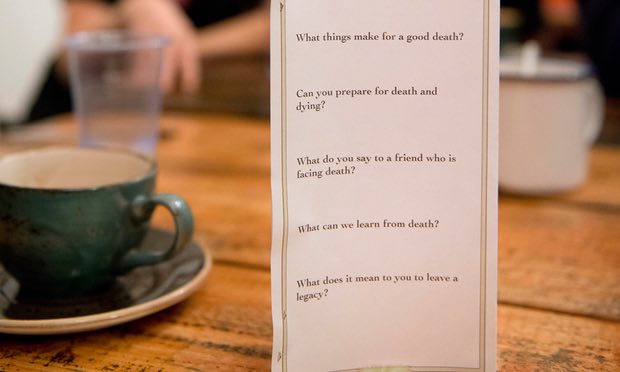Medical students do not learn how to talk about death. Junior doctors are forced to learn on the job – and that isn’t fair on patients or families

By Isabella Laws
[I]t is taboo in British culture to talk about death. We say someone has “passed away”, “kicked the bucket” or “left us” – anything to avoid even using the word. This has consequences. While 70% of people wish to die at home, half of us will actually die in hospital. Our reluctance to talk about death and make our wishes known is part of the reason for this.
So I didn’t expect to enjoy visiting a death cafe. As soon as I arrived, I knew I had made the right decision, however. The room hummed with a low level of chatter, and I felt prepared to practise talking about death and dying.
On that particular morning there were six of us in the cafe: two academic psychologists, a woman who had lost her husband in her early 30s, a grief counsellor and a man who had had a near-death experience. There was also a group leader, although the conversation was completely unstructured save for initial introductions – and the proviso that everything we discussed must be about death.
Death cafes were founded in the UK in 2011, inspired by a Swiss model, and the aim is simple: to increase awareness and openness about death with a view to helping people make the most of their (finite) lives. There are now more than 4,000 cafes held around the UK, Europe and north America.
After the death cafe, I couldn’t believe that I had spent two hours talking exclusively about dying. It was satisfying to talk to others who were honest about their experiences and fears. Nearly everyone regretted not speaking more frankly about it with their parents before they died. They also worried about raising the topic with their children: who should raise it? When is the right time? What if they shut the conversation down? One woman asked the group what kind of legacy we each wanted to leave behind. She worried that she had not been close to her family and they would not remember her in the way she wanted when she dies.
I was by far the youngest person there. This is unsurprising – people in their 20s don’t often think about death. I went because there is a fundamental lack of teaching at medical school to prepare you for the fact that this is something I will have to deal with every day as a doctor. In six years of study, I will have had just one small group session on “breaking bad news”. Yet as soon as I am qualified, I will be expected to talk about death and dying to patients and their loved ones on a daily basis. Last year, I saw a doctor only months out of medical school comfort a woman after her husband’s death. The same would be expected of me in just over a year’s time – and I was not ready.
In 2000, an average of 20 hours (pdf) were dedicated to palliative care teaching at medical school. I certainly haven’t experienced any increase on that figure, 17 years later.
I have witnessed good practice during my training, but there have also been times when I wished I wasn’t in the room. Last year, while sitting in on a neurology clinic, I watched as a patient was told they had motor neurone disease. Their face went blank and pale with shock, but the doctor seemed oblivious and launched into a monologue about the patient’s treatment options and prognosis. I sat in the corner of the room, powerless to intervene. Without teaching doctors effective communication skills as students, how can we be expected to fare any better?
A survey of junior doctors by the Royal College of Physicians of Edinburgh in 2013 found that only half felt prepared for communicating with dying patients and their families. This figure rose to 70% for their clinical trainers.
This lack of teaching lets down not just students, but patients too. A lack of guidance means junior doctors are forced to learn on the job. Undoubtedly, they will improve in time. The patients and families who experience unsatisfactory or even upsetting communication along the way are simply collateral damage.
Death cafes aren’t a solution to lack of teaching, but I think they make a good start. All medical students should attend one. It’s something all of us, without exception, will be affected by. Only through practising these skills can we hope to be effective and sensitive communicators when the time comes for us to break bad news.
Complete Article HERE!
